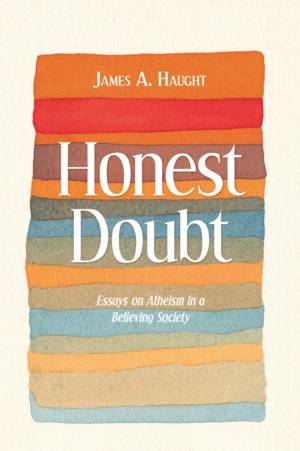
- Afhalen na 1 uur in een winkel met voorraad
- Gratis thuislevering in België vanaf € 30
- Ruim aanbod met 7 miljoen producten
- Afhalen na 1 uur in een winkel met voorraad
- Gratis thuislevering in België vanaf € 30
- Ruim aanbod met 7 miljoen producten
Zoeken
€ 27,95
+ 55 punten
Omschrijving
Despite the prevalence of religious belief in the United States (nearly 200 million Americans belong to 350,000 congregations), a growing minority (14 percent) of U.S. adults identify with no religion whatsoever. Journalist James A. Haught addresses the secular segment of American society in this interesting collection of incisive essays that give voice to honest doubts about religious beliefs. Taken together, Haught's essays endorse the idea that freedom of religion must include freedom to doubt as well as to believe. Individually, the articles present many different reasons to doubt: - Intellectual integrity demands that we express doubts about beliefs for which there is no scientific evidence.- The historical record, past and present, shows that religion is often the cause of evils, from the Inquisition and the burning of witches to current terrorist violence committed in the name of religion.- Natural evils, such as the 2004 Asian tsunami and devastating diseases, should make any thoughtful person question whether an all-powerful and all-merciful God governs the universe.- The sheer number and diversity of often-conflicting belief systems raise serious doubts about the philosophical coherence of religion as an approach to finding the truth.- Scandals among the clergy undermine the credibility of religion as a sound basis for morality.Written in a straightforward conversational style that makes clear the many scientific, philosophical, and ethical difficulties that plague religion, Haught's thought-provoking essays will appeal to atheists, agnostics, and anyone with questions about religion.
Specificaties
Betrokkenen
- Auteur(s):
- Uitgeverij:
Inhoud
- Aantal bladzijden:
- 152
- Taal:
- Engels
Eigenschappen
- Productcode (EAN):
- 9781591024590
- Verschijningsdatum:
- 1/03/2007
- Uitvoering:
- Paperback
- Formaat:
- Trade paperback (VS)
- Afmetingen:
- 155 mm x 227 mm
- Gewicht:
- 204 g

Alleen bij Standaard Boekhandel
+ 55 punten op je klantenkaart van Standaard Boekhandel
Beoordelingen
We publiceren alleen reviews die voldoen aan de voorwaarden voor reviews. Bekijk onze voorwaarden voor reviews.











